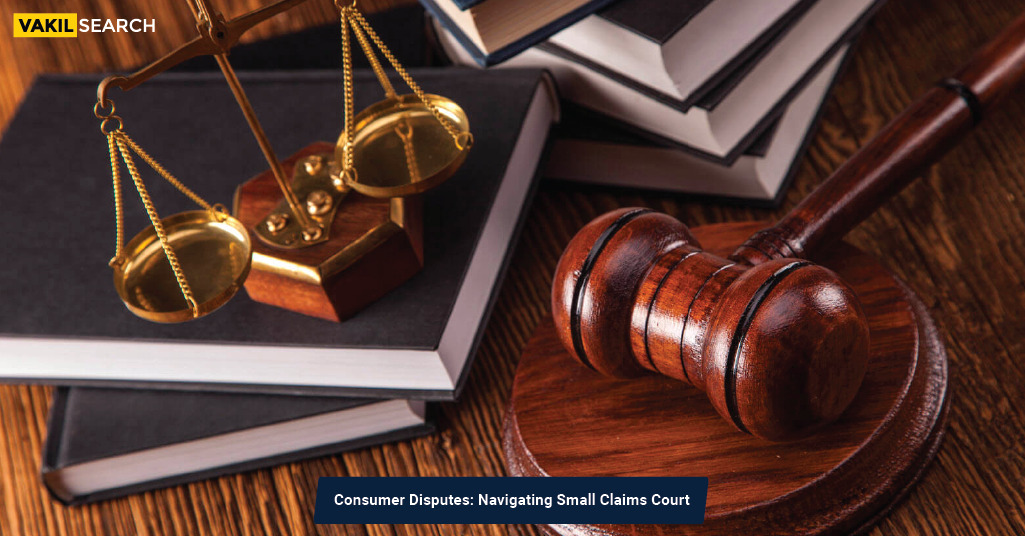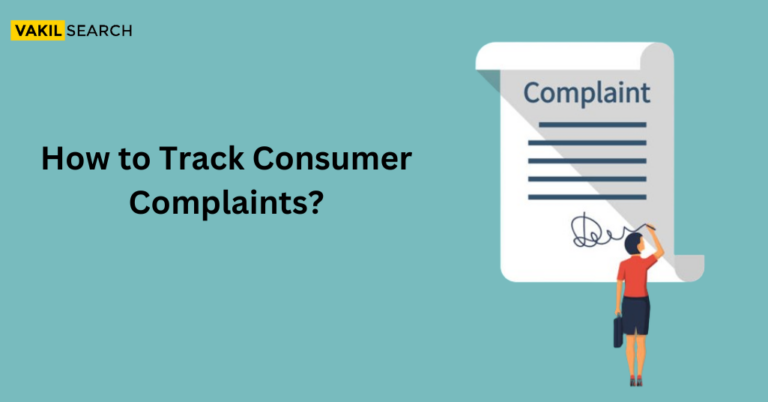Learn about resolving conflicts involving goods, services, property damage, unpaid debts, and more. Seek guidance for a smooth legal process.
Overview
Consumer dispute can sometimes arise in the world of commerce. It leaves individuals feeling frustrated, powerless, and unsure of how to seek resolution. Fortunately, small claims court provides an accessible avenue for consumers to assert their rights and seek remedies cost-effectively and efficiently.
This article aims to assist consumers in navigating the complexities of small claims court. It empowers them to understand their rights, prepare a strong case, and confidently present their arguments.
Introduction to Consumer Dispute and Small Claims Court
Consumer dispute arise when a consumer disagrees with a business over goods or services provided. The aggrieved consumer can take the matter to court when such disputes cannot be resolved informally. In India, the small claims court is an appropriate forum for consumers seeking justice for relatively small monetary claims.
Small claims court is a specialised court that deals with claims for amounts up to a certain limit, typically ranging from ₹ 10,000 to ₹ 2,00,000, depending on the state. The small claims court provides consumers with a simple, cost-effective way to resolve their disputes.
Understanding Consumer Rights to Consumer Dispute
Consumer rights are fundamental in protecting individuals from unfair business practices and ensuring a fair and safe marketplace. Awareness of these rights is crucial when dealing with consumer dispute and seeking resolution. Here are the key points to know
- Consumer Protection Laws: Laws exist to prevent unfair practices and protect consumers from harm.
- Common Disputes: Disputes can arise from faulty products, misleading advertising, or unfair services.
- Know Your Rights: Research the laws that protect consumers in your area.
- Gather Evidence: Collect and organize documents that support your claim.
- Rights in Action: Consumer rights include accurate information, fair pricing, safety, privacy, and redress.
Small Claims Court Procedures and Requirements
To register a case in the small claims court, the consumer must adhere to particular guidelines and conditions. Finding the proper court where the case should be filed is the first step. The consumer must file the lawsuit in a court that has jurisdiction over the company or the location of the transaction. Consumers have two options for filing cases: in person or through a lawyer. The consumer must pay a small filing fee to the court in order to start the case.
To substantiate their claim, the customer must offer the required paperwork and supporting documentation. This can include any pertinent documents, such as emails, contracts, invoices, and receipts. The consumer must also submit a short and unambiguous summary of their claim to the court. The statement should include the details of the dispute, the amount claimed, and any other relevant information.
Preparing Your Case for Small Claims Court
Before the hearing, the consumer should prepare their case thoroughly. This includes organising their documents and evidence, preparing a clear and concise statement of their claim, and preparing any witnesses they may need to testify. The consumer should also be prepared to respond to any questions the judge may ask.
The consumer needs to understand the law well and the relevant legal principles. The consumer should also know any deadlines or time limits that may apply to their case. The consumer may also want to consider consulting a lawyer for advice and guidance on preparing their case.
Consumer Dispute- Presenting Your Case in Small Claims Court
On the day of the hearing, the consumer should arrive at the court on time and be dressed appropriately. The consumer should bring all their documents and evidence with them and be prepared to present their case to the judge. The judge will listen to both sides and ask any questions they may have. The judge may also ask the consumer to provide further evidence or information.
The consumer should be clear and concise when presenting their case to the judge. They should focus on the facts of the dispute and avoid emotional or irrelevant arguments. The consumer should also be respectful and polite to the judge and the other party.
Post-Trial Options and Considerations
After the hearing, the judge will make a decision and issue a judgment. If the judge finds in favor of the consumer, they may order the business to pay the consumer the amount claimed, along with any interest or costs. If the judge finds in favor of the business, the consumer may have to pay the business’s legal costs.
If the consumer is unsatisfied with the judgment, they may have the option to appeal the decision. However, strict time limits and other requirements for appealing a small claims court decision may exist.
Consumers must consider the costs and benefits of pursuing a small claims court case. While small claims court is a relatively simple and cost-effective way of resolving consumer dispute, there may be better options. Alternatively, alternative dispute resolution methods, such as mediation or arbitration, may be more appropriate.
Consumer Disputes Relating to Goods and Services
The Consumer Disputes Redressal Commission’s jurisdiction comes into effect when a ‘complaint’ is lodged by a ‘complainant’.
The Consumer Protection Act, 2019 applies to all goods and services, except where specifically excluded by the Central Government through notification (Section 1(4) of the Act).
Disputes concerning land and immovable property are not covered under consumer disputes. This is because there is no sale of ‘goods’ or ‘services’ involved. Nevertheless, complaints related to services connected with immovable property can be raised.
Since land is immovable and not considered ‘goods’, disputes regarding the sale or allotment of land fall outside the scope of the Consumer Protection Act (CPA). A case in point is the ruling in Krishan Baldev Gupta v. Haryana State Development Corpn. (1993) II CPJ 191 (NCDRC).
In the case of Shaila Construction v. Nainital Lake Development III (1996) CPJ 11 (NCDRC), it was established that there is no hire of services when there is an outright sale of immovable property. However, complaints about deficiencies in service can still be lodged.
Types of Claims Filed in Small Claims Court
Small claims court is designed to handle minor disputes and provides an accessible and cost-effective way for individuals and businesses to seek resolution. Various types of claims can be filed in small claims court, ranging from contractual disagreements to property damage disputes.
Unpaid Debts: One of the most common claims filed in small claims court involves unpaid debts, such as unpaid loans, credit card debts, or unpaid invoices for goods or services.
Property Damage: Claims related to property damage, like a neighbor’s tree falling on your property or damage caused by a contractor’s work, can also be addressed in small claims court.
Security Deposits and Rent: Disputes over security deposits or unpaid rent between landlords and tenants are often brought to small claims court.
Contract Disputes: Small claims court can handle cases where there is a breach of contract, such as failure to fulfill obligations stated in a written or verbal agreement.
Personal Injury: Minor personal injury claims, like medical expenses resulting from a simple accident, may be appropriate for small claims court, although more serious cases generally go to higher courts.
Consumer Disputes: Claims related to faulty products, substandard services, or deceptive business practices can also be pursued in small claims court.
Trespassing or Nuisance: Disputes arising from trespassing, property nuisance, or disturbances between neighbors can find resolution in small claims court.
It is essential to be aware of the monetary limits set by each jurisdiction as they vary from region to region. While small claims court offers a simplified process, parties involved should be prepared with evidence and documentation to support their claim before appearing in court. Consulting with an attorney or seeking guidance from the court’s self-help resources can help ensure a smooth presentation of the case.
Conclusion
Consumer dispute are common in the marketplace, and small claims court allows consumers to seek justice. Consumers must follow the rules and prepare carefully to present their case effectively in small claims court. Consumers need to know their rights and seek legal help if they need it.
But small claims court is only sometimes the best way to resolve a dispute. Consumers should think about the pros and cons of going to court and other ways to solve the problem.
Small claims court can be a helpful and affordable way for consumers to solve small problems. Just follow the rules, be prepared, and consider other options.
Vakilsearch can assist consumers in navigating small claims court for consumer disputes. Vakilsearch’s experienced lawyers can provide consumers with expert guidance on the legal procedures. We can assist consumers with document preparation, ensuring all necessary documents are in order and filed correctly. Contact us today.
FAQ
What should I consider before I file a small claims case?
Prior to initiating a claim in small claims court, it is essential to take into account the other party's ability to make payment. If you are unsure about the financial standing of the other party, you have the option to engage a tracing agency to gather relevant information. This will enable you to determine whether the other party possesses the means to settle the amount you are seeking in your claim.
Where can I get more information and instruction about small claims cases?
For comprehensive insights into small claims court, explore the Small Claims section of this website. There, you'll find valuable details about various aspects, such as initiating a lawsuit, responding to a claim, engaging in mediation, attending court sessions, appealing a judgment, and handling judgment collection or disputes. Furthermore, you have the opportunity to enroll in a complimentary small claims class, which provides essential guidance. To check class schedules, locations, and sign-up details, visit Free Classes.
Where can I find forms for my small claims case?
To assist parties in small claims cases with self-representation, courts have designed forms encompassing most necessary documents for your case. These forms are accessible at no cost through the Self-Help Center or can be downloaded from their official website. For specific cases in Las Vegas or Henderson Justice Court, unique forms and procedures are available, distinguishable from other courts in Clark County. Make sure to select the appropriate forms tailored to the respective court. Additionally, you may inquire directly at the justice court where your case will be filed for access to the necessary forms. For links and contact details of justice courts, please visit the Justice Courts section.
What are the basic steps in a small claims case?
The basic steps in a small claims case typically include filing a claim, serving the defendant with the claim, attending a court hearing, and obtaining a judgment from the court.










